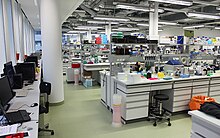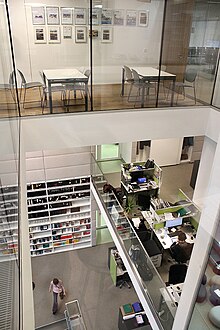Research Institute for Molecular Pathology
| Research Institute for Molecular Pathology | |
|---|---|

|
|
| founding | 1985 |
| Sponsorship | Boehringer Ingelheim |
| place | Vienna , Austria |
| Scientific Director Commercial Director |
Jan-Michael Peters Harald Isemann |
| Employee | 270 |
| Annual budget | 35 million |
| Website | www.imp.ac.at |
The Research Institute for Molecular Pathology (IMP, often Research Institute of Molecular Pathology) is a biomedical research institution that conducts basic research in the field of molecular life sciences.
The IMP is part of the Vienna Biocenter (VBC) in Vienna , Austria . The institute employs around 270 people from 40 countries, of which around 230 are scientists. The working language at the IMP is English. The IMP was founded in 1985 and is financed by the pharmaceutical company Boehringer Ingelheim and project funds from various funding agencies.
IMP scientists publish around 60 to 90 publications in international specialist media every year. 93 patents have been filed since 1985 and IMP scientists have received 13 ERC grants . Five IMP scientists were awarded Wittgenstein prizes .
The core budget for the ongoing operation of the IMP is provided by Boehringer Ingelheim. Substantial further funds are obtained from project grants that are obtained from the working groups. Important sponsors are in particular the Austrian Fund for the Promotion of Scientific Research (FWF); the Austrian Research Promotion Agency (FFG); the Vienna Science and Technology Fund (WWTF); the European Research Council (ERC); the Human Frontiers Science Program (HFSP); and other national and international funding agencies.
research
Research at the IMP is dedicated to molecular mechanisms and principles that underlie complex biological processes. Six main topics can be derived from the work of the IMP research groups:
- Molecular and Cell Biology
- Structural biology and biochemistry
- Gene Expression and Chromosome Research
- Stem Cell Research and Developmental Biology
- Immunology and Cancer Research
- Neuroscience
Research in these fields is carried out in 15 independent working groups, each led by a group leader:
- Meinrad Busslinger : Stem Cell Differentiation and Hematopoiesis
- Tim Clausen: Molecular Mechanisms of Protein Quality Control
- Luisa Cochella: spatio-temporal specificity of miRNA function and its importance for cell type specification
- David Haselbach: Function of Molecular Machines
- Wulf Haubensak: Network Mechanisms of Emotional Behavior
- David Keays: Neural Migration and Magnetoreception
- Anna Obenauf: Molecular Mechanisms of Metastasis and Drug Resistance
- Andrea Pauli: Functions of short, translated Open Reading Frames (ORFs) in development
- Rushad Pavri: Molecular Mechanisms of Antibody Differentiation
- Clemens Plaschka: Ultrastructure of RNA regulation
- Jan-Michael Peters : Mitosis and Chromosome Biology
- Alexander Stark: Systems Biology of Regulatory Motives and Networks - Understanding the Gene Expression of DNA Sequences
- Elly Tanaka : Molecular Mechanisms of Vertebrate Regeneration
- Alipasha Vaziri (Associate Group Leader): Dynamics of Coupled Biological Systems: Methods and Phenomena
- Manuel Zimmer: Neural Basics of Behavior
- Johannes Zuber: Identification and characterization of possible tumor therapeutics using advanced RNAi technology
Well-known former employees are for example Adriano Aguzzi (Postdoc 1989 to 1992), Angelika Amon (Master's student / PhD student, 1989 to 1993), Adrian Bird (Senior Scientist, 1987 to 1990), Max Birnstiel (Director, 1988 to 1996), Jürgen Knoblich (group leader 1997 to 2004), Kim Nasmyth (Senior Scientist / Director, 1988 to 2003), Giulio Superti-Furga (PhD student, 1988 to 1990) and Martin Zenke (group leader, 1988 to 1995).
history
The IMP was founded in 1985 as a joint project between Boehringer Ingelheim and Genentech . The institute started operations in 1988 under the scientific direction of Max Birnstiel .
In 1992, five institutes from the Faculties of Natural Science and Medicine at the University of Vienna moved into a neighboring building, the basis for today's Max F. Perutz Laboratories (MFPL) . As a result, the area was referred to as the “Vienna Biocenter” and continuously developed.
In 1993 Boehringer Ingelheim took over all IMP shares from Genentech. In 1997 Kim Nasmyth took over the scientific management of the IMP.
In 2006, two institutes of the Austrian Academy of Sciences started operations: the Institute for Molecular Biotechnology (IMBA) and the Gregor Mendel Institute for Molecular Plant Biology (GMI) , both of which were subsequently to cooperate closely with the IMP. That same year, Barry Dickson became the Scientific Director of the IMP.
Jan-Michael Peters has headed the IMP as Scientific Director since 2013 , Harald Isemann has been Commercial Director since 2004. In 2016, the IMP moved into the new building planned integrally by ATP architects ingenieure (Vienna), which was officially opened on March 1, 2017.
Facilities
The VBC PhD program is an international doctoral program that is jointly supported by the four research institutes of the Vienna Biocenter (IMP, IMBA, GMI and MFPL). Admission to the program takes place twice a year (April and November) through a comprehensive selection process. Participation in the VBC PhD program is a prerequisite for working as a doctoral candidate at the IMP.
The IMP operates a number of cost-intensive service points in cooperation with IMBA and GMI. These are available to the scientists of all institutes as an internal service and include bioinformatics, biooptics (microscopy), comparative medicine, mass spectroscopy and protein chemistry, as well as the Max Perutz library.
In addition to the institute's own service points, researchers at the IMP can also use the Vienna Biocenter Core Facilities. In addition to scientific service points such as microscopy, bioinformatics, electron microscopy, histopathology, metabolomics, sequencing, plant culture, preclinical imaging, protein technologies and the Vienna Drosophila Resource Center, these also include a kindergarten.
To review its scientific level, the IMP relies on its Scientific Advisory Board (SAB), which is made up of established scientists and meets once a year. The chairperson of the SAB is (as of 2017) Leslie Vosshall from Rockefeller University . The other members are Angelika Amon ( Massachusetts Institute of Technology ); Hans Clevers ( Hubrecht Institute ); Michael Hausser ( University College London ); Norbert Kraut (Boehringer Ingelheim); Dan Littman ( New York University Langone Medical Center ); Ruslan Medzhitov ( Yale School of Medicine / HHMI ); Tom Rapoport ( Harvard Medical School ); and Dirk Schübeler ( Friedrich Miescher Institute ).
Web links
Individual evidence
- ^ The Research Institute of Molecular Pathology: IMP at a glance | Research Institute of Molecular Pathology (IMP). Retrieved July 21, 2017 .
- ↑ Welcome to the Vienna Biocenter. Retrieved July 21, 2017 .
- ^ The Research Institute of Molecular Pathology: Funding & Sponsorship | Grants & Donor Bodies | Research Institute of Molecular Pathology (IMP). (No longer available online.) Archived from the original on August 16, 2017 ; accessed on July 21, 2017 (English). Info: The archive link was inserted automatically and has not yet been checked. Please check the original and archive link according to the instructions and then remove this notice.
- ^ The Research Institute of Molecular Pathology: Publications | IMP Scientific Papers | Research Institute of Molecular Pathology (IMP). Retrieved July 21, 2017 .
- ^ FWF Project Finder. Retrieved August 22, 2017 .
- ^ The Research Institute of Molecular Pathology: Funding & Sponsorship | Grants & Donor Bodies | Research Institute of Molecular Pathology (IMP). (No longer available online.) Archived from the original on August 16, 2017 ; accessed on July 21, 2017 (English). Info: The archive link was inserted automatically and has not yet been checked. Please check the original and archive link according to the instructions and then remove this notice.
- ^ The Research Institute of Molecular Pathology: Research Institute of Molecular Pathology | Main Research Areas. Retrieved July 21, 2017 .
- ^ Vienna Biocenter. Retrieved August 22, 2017 (English).
- ↑ IMP new building , accessed on February 21, 2018.
- ^ Maria Wirth: The Campus Vienna Biocenter . 1st edition. StudienVerlag, Innsbruck, Vienna, Bozen 2013, ISBN 978-3-7065-5305-6 , pp. 178 .
- ↑ Vienna Biocenter PhD Program. Retrieved July 21, 2017 .
- ↑ Intranet - IMP / IMBA. Retrieved July 21, 2017 .
- ↑ VBCF | Home. Retrieved July 21, 2017 .
- ^ The Research Institute of Molecular Pathology: Scientific Advisory Board | Research Institute of Molecular Pathology (IMP). (No longer available online.) Formerly in the original ; accessed on July 21, 2017 (English). ( Page no longer available , search in web archives ) Info: The link was automatically marked as defective. Please check the link according to the instructions and then remove this notice.
Coordinates: 48 ° 11 ′ 19.6 ″ N , 16 ° 24 ′ 3.1 ″ E


